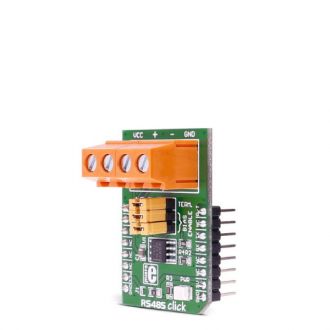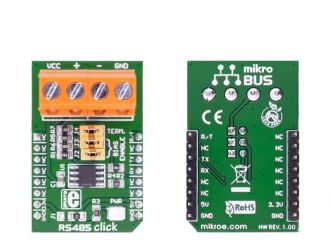
We strongly encourage users to use Package manager for sharing their code on Libstock website, because it boosts your efficiency and leaves the end user with no room for error. [more info]

Rating:
Author: MIKROE
Last Updated: 2018-05-25
Package Version: 1.0.0.1
mikroSDK Library: 1.0.0.0
Category: RS485
Downloaded: 14699 times
Followed by: 2 users
License: MIT license
RS485 click 5V is an RS422/485 transceiver Click board, which can be used as an interface between the TTL level UART and the RS422/485 communication bus.
Do you want to subscribe in order to receive notifications regarding "RS485 5V click " changes.
Do you want to unsubscribe in order to stop receiving notifications regarding "RS485 5V click " changes.
Do you want to report abuse regarding "RS485 5V click ".


Library Description
Library initializes and defines GPIO driver and performs control of device voltage.
For more details check the documentation.
Key functions:
Example description
The application is composed of three sections:
void applicationTask()
{
char tmp;
uint8_t rdyFlag;
// RECEIVER - UART polling
rdyFlag = rs485_byteReady();
if (1 == rdyFlag)
{
tmp = rs485_readByte();
mikrobus_logWrite( &tmp, _LOG_BYTE );
}
// TRANSMITER - TX each 2 sec
/*
for (tmp = 0; tmp < 9; tmp++)
{
rs485_writeByte( MESSAGE_DATA[tmp] );
mikrobus_logWrite( "MESSAGE SENT", _LOG_LINE );
}
Delay_ms(2000);
*/
}
Other mikroE Libraries used in this example:
Additional notes and information
Depending on the development board you are using, you may need USB UART click, USB UART 2 click or RS232 click to connect to your PC, for development systems with no UART to USB interface available on the board. The terminal available in all MikroElektronika compilers, or any other terminal application of your choice, can be used to read the message.